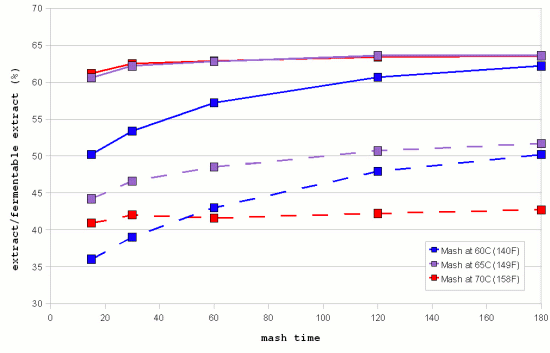I like this subject, b/c it is a gread topic that illustrates how mashes and their enzymes behave.
I tried shorter mashes but not 15-minute mashes. I think the shortest was 30 minutes and I did it several times. What I found was that my efficiency wasn't nearly as 'stable' as usual (I had lower efficiency a couple of times) and my fermentability was harder to get on target. So I lengthened it but I still tend to mash on the short side regarding time.
If plotted over time, extract and attenuation will reach some level of saturation. That means heir change over time declines. Here is some great data from Windisch that I found in Brigg's book. I have similar plots, but they are not as nice:
extract (solid lines) and fermentable extract (dashed lines) achieved with isothermal mashes at 3 different temperatures. (Data by Windisch, Kolbach and Schild via [Briggs, 2004](
http://braukaiser.com/wiki/index.php?title=Starch_Conversion#Temperature_and_Time)
As you can see, the hotter the mash the earlier will that saturation be reached but the fermentability (dashed line) may stall below your target. That's where you have to mash at a lower temp. In this example, if you mash at 65C (149F) you'll still see the fermentability rise as you mash longer and the shoter your mash, the more does the length of the mash matter. Note that mashing is not done when you drain the mash. As long as the wort temp is below 160F you'll have more or less active b-amylase which can make more fermentable sugars. And a-amylase, which doesn't denature completely until 180F, can do that too, but much less effectively.
That's why Spanisch Ale saw this unprecictability in efficiency and attenuation. He was still on the part of the slope where it changes with time.
Granted, this data is from the middle of last century and malts have improved. While the numbers from this chart cannot be applied to today's malts, the qualitative form of these curves can.
If I were a commercial brewer and would brew the same beer every day, I would have the time and control to find the least amount of time that I need to mash to hit my targets. But I'm not, that's why I like to keep mashing longer so my results are more predictable and not as easily affected by changes in the time it takes to drain the mash or heat the wort.
Kai




